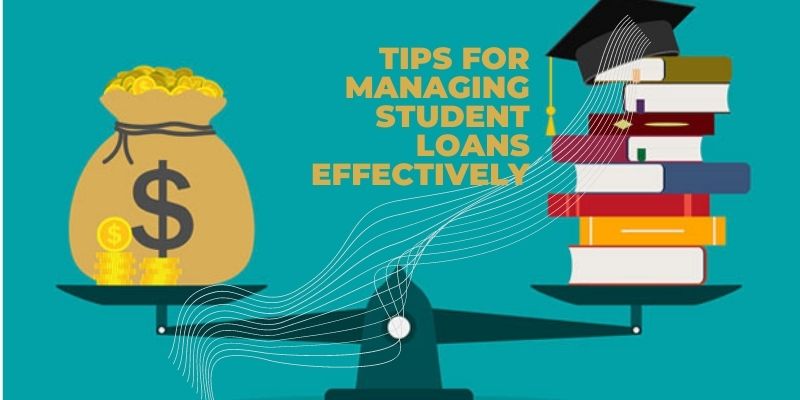College graduates are finding it more difficult to purchase a home due to the load of student loans, and legislators are now debating solutions to the issue. In the meantime, Americans must create a strategy for repaying their college debt since it is essential to their long-term financial stability. seao.info will provide for you 10 Tips for managing student loans effectively in here
10 Tips for managing student loans effectively
1. Calculate Your Total Debt

The first thing, Tips for managing student loans effectively you should know about any kind of debt is how much you owe overall. Students typically leave school with a number of debts, possibly both nationally and privately supported, having secured additional funding each year they attended.
You cannot create a strategy to reduce your debt, consolidate it, or possibly apply for and be granted debt forgiveness without first understanding the exact amount of your debt.
2. Know the Terms
Learn the terms of each loan as you calculate the total of your debt. Each could have a unique interest rate and payback schedule. You’ll require this information to create a repayment strategy that prevents further interest, charges, and penalties.
3. Review the Grace Periods
You will discover that each loan has a grace period as you put the details together, Tips for managing student loans effectively. Following graduation, you have this amount of time before you must begin making loan repayments.
Depending on the type of loan you have, different grace periods apply. For instance, Perkins loans give you nine months before you must begin making payments, whereas Stafford loans have a six-month grace period.
4. Consider Consolidation

Tips for managing student loans effectively, When you have all the information, you might want to consider combining all of your loans. The main benefit of consolidation is that it frequently lightens the load of your monthly obligations. Additionally, it can extend your payoff period, which is a mixed blessing because it would also need you to make additional interest payments.
Furthermore, you might pay a greater interest rate on the merged loan than you do on some of your existing loans. Before you agree to a consolidation loan, make sure to compare loan terms.
Before consolidating, there is another important consideration. Consolidation revokes your eligibility for several federal loans’ deferment choices and income-based repayment programs.
5. Use the Debt Avalanche Strategy
The debts with the highest interest rates should always be paid off first, Tips for managing student loans effectively as with any debt repayment plan. Budgeting a specific amount above the needed monthly payments and then allocating the extra money to the loan with the highest interest rate is one typical strategy.
Once that loan is paid off, move on to the loan with the second-highest interest rate, the third-highest loan, and so on until you are debt-free. This involves applying the total monthly payment on that loan (the regular payment plus the excess). This is a variation of the debt avalanche strategy, Tips for managing student loans effectively.
6. Pay Down Principal

Paying more principal whenever you can is another popular debt-reduction method. Over the course of the loan, you will pay less interest if you lower the principal more quickly.
Less principal results in a smaller interest payment because interest is dependent on the principal each month.
7. Pay Automatically
If you agree to set up your payments to be automatically deducted from your checking account each month, some private and government student loan lenders will reduce the interest rate. For instance, the Federal Direct Loan Program offers a 0.25% discount to participants.
8. Explore Alternative Plans
You might be able to arrange an alternate repayment plan with your loan servicer over the phone if you have a federal student loan Tips for managing student loans effectively. Several possibilities include:
Over the course of the loan’s 10-year term, your monthly payments will increase every two years under graduated repayment. Early payments under this arrangement can be modest to accommodate entry-level incomes. Additionally, it implies that as the decade goes on, you’ll gain promotions or change to positions with higher compensation.
Extended repayment: By spreading out your loan over a longer time frame—say, 25 years as opposed to 10 years—you’ll be able to make smaller monthly payments.
Income contingent repayment: For up to 25 years, payments will be based on your AGI, but at a maximum of 20% of your income. Any remaining balance on your debt will be waived after 25 years.
Pay as you go: If you can demonstrate financial difficulty, this limits monthly payments to 10% of your monthly salary for up to 20 years. The requirements can be stringent, but once you’ve met them, you’re allowed to keep paying into the plan even if your circumstances have improved.
Although your monthly payments may be reduced by these plans and other repayment choices, keep in mind that you can end up paying interest for a longer length of time as a result. Furthermore, none of these choices can be used for private student loans.
9. Defer Payments
You can request a payment delay from your student loan lender if you do not yet have a job. The federal government may not charge you interest during the authorized deferment term if you have a federal student loan and you are eligible for deferment.
Asking your lender for forbearance, which enables you to temporarily stop making loan payments for a specified period of time, may be an option if you are not eligible for deferral. Any interest that becomes due during the forbearance period will be added to the loan’s principal.
10. Explore Loan Forgiveness
You could be eligible to request student loan discharge or debt forgiveness in some exceptional cases. If your school closed before you could complete your degree, you were rendered totally and permanently incapacitated, or repaying the debt would force you into bankruptcy, you might be eligible.
If you have been employed as a teacher or in another public service occupation, you have another, less dramatic but more precise option for student loan forgiveness.


